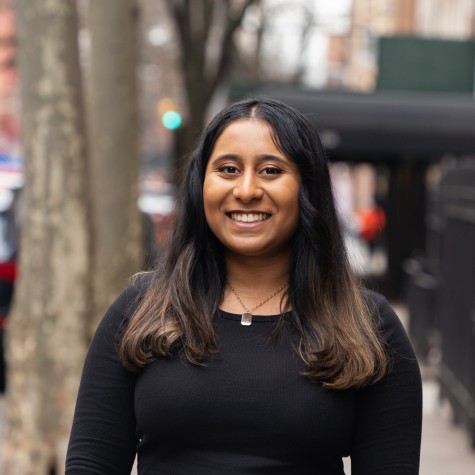‘I’m scared for my life’: An Afghan student on the collapse of Afghanistan
An anonymous NYU Abu Dhabi junior, born a Shia Hazara Muslim in Kabul, shares her story of the Taliban’s takeover of Afghanistan.
A junior at NYU Abu Dhabi who was born and raised in Kabul fears the effects that the Taliban regime could have on her livelihood as a student. NYU as well as NYU’s Islamic Center say they have been working to support students and faculty affected by the turmoil. (Staff Photo by Roshni Raj)
September 8, 2021
Since her childhood, an anonymous junior at NYU Abu Dhabi born and raised in Kabul — has feared the Taliban after she watched the militant group attack schools in Afghanistan. As she grew older, her family started praying after every meal.
“Thank you for the food. Thank you for the health. And please don’t bring the Taliban,” she recalled hearing at the dining table. “It was something that was always at the forefront of our mind because we actually were affected by it.”
Now, following a months-long Taliban offensive and a rushed withdrawal by the U.S. military, who left the country on Aug. 31, her home is fully controlled by the Taliban.
She said the years of U.S. military occupation that followed the Sept. 11 attacks and the Taliban’s recent takeover left many Afghans in survival mode — hoarding resources, fearing violence on the streets, and only attending school and work when possible.
“I’m sick of people acting like this is a new thing that has just been happening,” the student said. “No country can fall overnight. We’ve been falling. We’ve been nosediving for decades.”
She also added that the years under military occupation were not as progressive as Western authorities claim.
“By no means do I speak for all Afghans, but people whose countries send aid to Afghanistan think about how much of an unstable regime they were empowering because they would then have to be critical of themselves,” she said. “You supported a regime that was unstable. You put in presidents that were unstable. You created a facade of women being much, much more empowered than they actually were.”
As a Hazara, Shia Muslim and woman — three demographics historically oppressed by the Taliban — the student is now unsure of her future. She recalls memories of visiting the Blue Mosque in the now Taliban-controlled city of Mazar-i-Sharif for Nowruz — the solar New Year — and going to see the ruins of Buddha statues in Bamiyan that were destroyed by the Taliban in 2001.
“It’s been a long process of things being stripped away from me,” she said. “We’d go [to Bamiyan], climb the broken Buddha and we would just look at a lot of potato fields. They have such amazing potato fields.”
NYU’s support for its Afghan community
NYU spokesperson Shonna Keogan said that although the university does not have any current or prospective students currently located in Afghanistan, it has been advocating on behalf of community members and scholars affected by the rapidly deteriorating political situation.
“This includes ongoing and frequent communications with members of Congress, as well as with the US Department of State,” Keogan wrote in a statement to WSN. “President Hamilton signed on to a letter, led by Scholars at Risk, housed here at NYU, calling on Secretary of State Blinken to intervene on behalf of Afghanistan’s scholars, students, practitioners, civil society leaders and activists. We are also working on other ways to support scholars who are able to make their way out of the country.”
The student, however, sustained herself this summer with an NYUAD stipend and does not know where she will seek accommodation during future academic breaks. Having an Afghan passport and visa, she fears being sent back to her country and having her legal documents becoming invalidated.
“The university administration never reached out to me — I emailed them and I told them about this issue with my passport,” she said. “I asked for legal protection in case something happens. I know that it’s a very paranoid point of view to have, but I am paranoid because, again, I’m at a very, very marginalized intersection and I’m scared for my life.”
Imam Khalid Latif, the executive director of NYU’s Islamic Center, said the center serves as a resource for students and faculty who need a space to process the trauma of these events. The center is also connecting individuals to refugee organizations, such as the International Rescue Committee and Islamic Relief USA, that are assisting with evacuations and resettlements.
“We have a pretty good number of Afghan students who are enrolled at NYU, but also many more who are alumni and individuals who come from a cross-section of backgrounds,” Latif said. “Anything that you can imagine touching somebody’s life in the last few weeks has been something that someone in our community has experienced. Whether that is the passing of a loved one, the murder of a loved one or someone being killed.”
A member and alum of our @ICNYU reached out to let us know that her husband was killed a little while ago in Afghanistan by the Taliban. Please keep him and all the people of Afghanistan in your prayers. May Allah grant them peace and make us from their supporters. Ameen.❤️
— Khalid Latif (@KLatif) August 13, 2021
The uncertain future of Afghanistan
A combination of economic strain, displaced populations, threats to security and questions about Taliban leadership leaves the future of Afghanistan uncertain.
While most American citizens in Afghanistan have returned to the United States and many countries have announced plans to take in Afghan refugees, analysts say many more evacuations are needed to bring those left in Afghanistan to safety. Latif, who has traveled to many refugee camps and conflict zones across the world, hopes other countries will welcome Afghans fleeing the conflict.
“My broader hope is that the people of Afghanistan are safe and they’re able to move forward in a way that is indicative of our shared humanity with them,” Latif said. “If we really love the security that we have and the comfort that we have in the part of the world that we’re in, we’d want that for other people and we want to then do what we could to help ensure that.”
Dana Burde, the director of international education at Steinhardt, researches community-based education in Afghanistan. She noted that the Taliban are turning women away from work and higher education and referenced reports where the Taliban are pressuring underage women into marriage.
“The situation is uneven across the country in terms of the way people are experiencing the takeover of the Taliban,” Burde said. “Some places are experiencing much more severe manifestations and others a little bit less so, but everywhere the Taliban in all the major cities have turned women away from offices and from higher education.”
Now that the Taliban has regained control, Afghan women are questioning the group’s stance on gender equality. On Sept. 2, the Agence France-Presse reported that a group of 50 women in Herat staged a rare protest demanding “education, work and security” under the new Taliban regime. On Sept. 4, the Associated Press reported that Taliban special forces fired gunshots into the air to disperse a women’s protest in Kabul.
The student remains devastated for Afghans, and particularly for Afghan women. She has doubts about the future of her country, but still has faith that Afghans will recover from the conflict.
“As hard as it is, I need to believe to keep on going — our people need to believe that,” she said. “For women, to live is not enough. For men, to live is not enough. For babies, to be alive is not enough. We shouldn’t settle for this. No one should have to settle down just for being alive another day. That’s not a life.”
Contact Roshni Raj at [email protected].




























































































































































